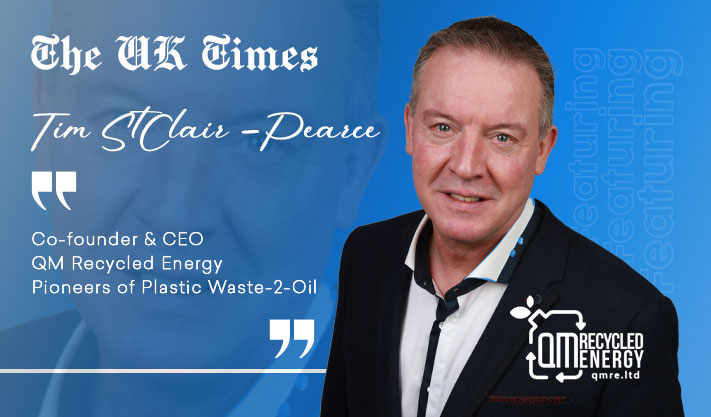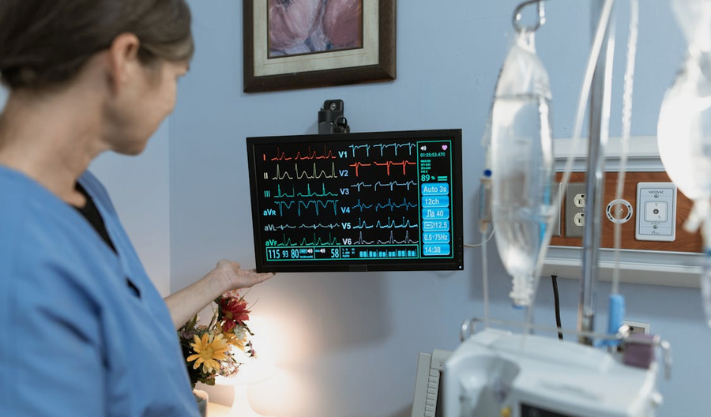Tim StClair-Pearce Interview
Tim StClair-Pearce, Co-Founder of QM Recycled Energy (QMRE), is leading one of the most innovative environmental movements of our time, transforming end-of-life plastics into valuable, renewable oil. With nearly four decades of experience in the plastics and packaging industries, he has redirected his expertise toward solving the very problem the industry helped create. Through advanced continuous thermolysis technology and strategic global partnerships, QMRE is building scalable, containerised plastic-to-oil systems that bring recycling directly to the source of plastic waste. Under Tim’s leadership, QMRE is proving that plastic pollution can be converted into both environmental progress and economic opportunity, paving the way for a cleaner, circular future.
The Inspiration behind QMRE
We started the interview by asking, “What inspired you to create QM Recycled Energy, and what problem are you determined to solve?”
Tim StClair-Pearce replied, “The founding of QM Recycled Energy in 2018 was driven by a deep frustration with the global plastic waste crisis. For decades, I worked within the plastics and packaging industries and witnessed the growing tide of pollution firsthand. I realised that the same material that brought so much convenience had become one of our planet’s biggest burdens. QMRE was born from a desire to “turn from poacher to gamekeeper” to use my knowledge to create good from harm. Our mission is clear: to provide a scalable, sustainable, and commercially viable solution to end-of-life plastics. We’re proving that waste can be transformed into a valuable resource, helping clean our environment while also creating green jobs and investment opportunities.”
How Plastic-2-Oil Technology Works
The UK Times: Can you explain how QMRE’s Plastic-2-Oil process works and why it’s groundbreaking?
Tim StClair-Pearce replied, “Our system uses advanced continuous thermolysis, an evolution of pyrolysis, to convert plastic waste into synthetic oil. Traditional methods rely on batch processing, which is slow and energy-intensive. QMRE’s model, however, enables a continuous flow, making the process efficient, scalable, and economically viable. By heating plastics in an oxygen-free environment, we break them down into hydrocarbons that can be reprocessed into new plastics or refined into fuels. What sets us apart is our containerised, modular design, which allows for local deployment taking the technology to where the waste exists instead of building massive central plants. This flexibility makes it possible to tackle plastic pollution at its source while creating circular economies at a community level.”
Power of the Eagle Partnership
The UK Times: QMRE has partnered with Eagle Technology of Norway. What does this partnership bring to the table?
Tim StClair-Pearce replied, “Our partnership with Eagle Technology, finalised in late 2023, marked a turning point. Eagle’s VIXLA range of pyrolysis systems aligns perfectly with our goals for efficiency, scalability, and sustainability. As Eagle’s exclusive distributor and operator in the UK and Ireland, QMRE is now responsible for manufacturing these systems under licence including engineering, software, and IP rights. This collaboration enhances our technological capability while allowing us to localise production, training, and system support. It also extends our reach through Eagle’s global network, alongside partners in Spain, Portugal, Belgium, and Africa. Together, we’re building a truly international movement to repurpose waste plastics and reduce dependence on fossil fuels.”
Innovation Driving QMRE Forward
The UK Times: What role does innovation play in QMRE’s approach to plastic recycling?
Tim StClair-Pearce replied, “Innovation is the cornerstone of everything we do. Our team of chemists, engineers, and environmental consultants constantly works on improving efficiency and system design. For example, our Q20 Pre-treatment System automatically cleans, shreds, and separates different polymers before processing, ensuring the best feedstock quality. Every upgrade moves us closer to a zero-waste goal. We also focus on decentralised deployment, meaning our systems can be installed in industrial zones, ports, or plastic waste centres anywhere in the world. This modular approach turns waste management into a flexible, revenue-generating operation. Innovation, for us, isn’t just about technology – it’s about changing the mindset around plastic waste and redefining it as a renewable resource.”
Turning Plastic Waste into Profit
The UK Times: Many people associate recycling with cost rather than profit. How does QMRE challenge that perception?
Tim StClair-Pearce replied, “At QMRE, we see plastic waste as a commodity, not a cost. Our systems transform a plastic waste stream into a profitable output – pyrolytic oil – which can be sold to petrochemical companies as a renewable feedstock for producing new plastics. This creates a circular economy, reducing landfill use and fossil fuel dependency while opening new revenue channels. Furthermore, our modular systems provide investors and local councils with scalable, cost-effective recycling solutions. We’ve designed our operations to be self-sustaining and energy-efficient, even generating the power needed to run the process. This combination of profitability and sustainability is key to long-term change. When green technology also makes economic sense, adoption follows naturally.”
QMRE’s Key Milestones & Growth
The UK Times: What milestones has QMRE achieved so far, and what’s next?
Tim StClair-Pearce replied, “We’ve come a long way since our early trials in Kent. In January 2024, we received our first VIXLA system, nicknamed Lilibet, capable of converting 1,000 kg of plastic into 1,000 litres of oil daily. By November 2024, our Hoo, Rochester facility became operational, complete with pre-treatment technology and our VIXLA V5 system, processing 5,000 kilos of waste per day. In 2025, we secured our Small Waste Incinerator Permit (SWIP), allowing full commercial operation. The next stage involves expanding our demonstration centres and licencing this technology across the UK and beyond. Our goal is to see hundreds of containerised plants operating globally, turning waste into opportunity and pollution into profit.”
Collaboration with Government & Investors
The UK Times: How do you collaborate with government bodies and investors to advance your mission?
Tim StClair-Pearce replied, “Collaboration is vital to what we do. We actively engage with local authorities, environmental agencies, and private investors to ensure our technology integrates seamlessly with existing plastic waste management infrastructures. By providing transparent data and on-site demonstrations, we’ve built strong relationships that foster trust and long-term commitment. Investors appreciate our dual focus on environmental and financial returns. We also work with policymakers to promote incentives for sustainable plastic waste conversion, helping shape the circular economy framework in the UK and Europe. Our approach proves that when public and private sectors collaborate with purpose, large-scale environmental transformation becomes achievable.”
A Vision for a Circular Future
Lastly we asked, “What is your long-term vision for QM Recycled Energy and the future of plastic waste management?”
“That there is a UK nationwide network of plastic waste-2-oil systems turning plastic waste back into its constituent parts – oil – that, with further processing, will be turned back into new and renewable plastic.
We envisage up to 100 sites across the country each with four VIXLAS installed, each of which will process 20 tonnes of plastic waste a day. This would mean that in a year a total of something like 550-600,000 tonnes of plastic waste would be recycled. That represents around 10% of the UK’s total plastic waste – removing an environmental problem and creating a valuable commodity.” Tim StClair-Pearce concluded
Connect with Tim StClair-Pearce on LinkedIn
For more information visit QM Recycled Energy
Also Read:
Hamdan Audi Alanazi: Leading Middle East–Europe green shift
Redefining Tomorrow: Dr. Pranay Misra on Tech & Critical Minerals
Fabrizio Capaccioli: Building a Sustainable Future Rooted























